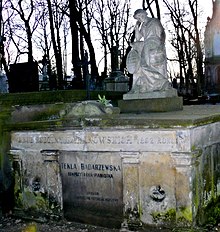Tekla Bądarzewska-Baranowska

Tekla Bądarzewska-Baranowska (1829/1834 – 29 September 1861) was a Polish composer.
Bądarzewska was born in 1829 in Mława[1] or 1834 in Warsaw.[2] to Andrezj Badarzewski and Tekla Badarzewska (Chrzanowska). Andrezj Badarzewski was a successful police commissioner, and moved his family to Warsaw in 1835.She married Jan Baranowski and they had five children in their nine years of marriage. Bądarzewska-Baranowska died on 29 September 1861 in Warsaw. Her grave in the Powązki Cemetery features a young woman with a roll of sheet music titled La prière d'une vierge. One of her daughters, Bronisława, was enrolled at the Warsaw Institute of Music in 1875.[3] A crater on Venus is named after her.
Early Works and Marriage
At age 14, Badarzewska composed and published her first piece, Vals Pour le Pianoforte dedicated to Anna Makiewicz, the benefactress of a local orphanage. This piece was published by Francizek Henryk Spiess, an important bookseller at the time.
Four years after the publication of her Vals, Badarzewska married Jan Baranowski, an army captain. In 1857, the Czarist authorities gave Baranowski the Order of St. Stanislaus (Russian Empire) third class. Later, in 1863, Baranowski was transferred to Tashkent because of the January Uprising, leaving Badarzewska alone with their 5 children.
A Maiden's Prayer
Bądarzewska wrote about 35 small compositions for piano; by far her most famous composition is the piece Modlitwa dziewicy, Op. 4 ("A Maiden's Prayer", Template:Lang-fr), which was published in 1856 in Warsaw, and then as a supplement to the Revue et gazette musicale de Paris in 1859.
Several musical scholars have spoken somewhat ill of Bądarzewska's musical career. Percy Scholes writes of Bądarzewska in The Oxford Companion to Music (9th edition, reprinted 1967): "Born in Warsaw in 1838 [sic] and died there in 1861, aged twenty-three [sic]. In this brief lifetime she accomplished, perhaps, more than any composer who ever lived, for she provided the piano of absolutely every tasteless sentimental person in the so-called civilised world with a piece of music which that person, however unaccomplished in a dull technical sense, could play. It is probable that if the market stalls and back-street music shops of Britain were to be searched The Maiden's Prayer would be found to be still selling, and as for the Empire at large, Messrs. Allen of Melbourne reported in 1924, sixty years after the death of the composer, that their house alone was still disposing of 10,000 copies a year."
The composition is a short piano piece for intermediate pianists. Some have liked it for its charming and romantic melody, and others have described it as "sentimental salon tosh." The pianist and academic Arthur Loesser described it as a "dowdy product of ineptitude."
The American musician Bob Wills arranged the piece in the Western swing style and wrote lyrics for it. He first recorded it in 1935 as "Maiden's Prayer." Later, it became a standard recorded by many country artists. It is also played on certain garbage trucks in Taiwan.[4][5]
In the 1930 opera Rise and Fall of the City of Mahagonny by Kurt Weill and Bertolt Brecht, scene 9 in act 1 is satirically based on a pianistic paraphrase of the piece, whose theme is quoted by the men's chorus later in the following ensemble.
In popular culture
In 2016, she appeared as one half of a pop idol duo with Pyotr Ilyich Tchaikovsky in an anime series, Classicaloid. She was portrayed by Mao Ichimichi.
References
- ^ Tekla Bądarzewska-Baranowska, Towarzystwo Przyjaciół Warszawy (in Polish). Some sources, like Percy Scholes in The Oxford Companion to Music, give 1838 as her year of birth; given that she died in 1861 and had 5 children in 9 years of marriage, that year seems unlikely. Other sources give 1834.
- ^ "Tekla Badarzewska-Baranowska" (in German). Archived from the original on 16 October 2007. Retrieved 25 November 2013.
{{cite web}}: CS1 maint: bot: original URL status unknown (link) - ^ Stanisław Szenic: Cmentarz Powązkowski 1851–1890, Warsaw 1981, p. 126 (in Polish)
- ^ "'A Maiden's Prayer': A call to dump all our garbage" Archived 11 August 2011 at the Wayback Machine by Leo Maliksi (7 October 2008)
- ^ "From Consensus to Shifting Coalition: Tri-partite Politics in the Taipei City Council"[permanent dead link], p. 21, by Jaushieh Joseph Wu, National Chengchi University, in Working Papers in Taiwan Studies No. 8 (where the piece is mistakenly attributed to Beethoven)
External links
 Media related to Tekla Bądarzewska at Wikimedia Commons
Media related to Tekla Bądarzewska at Wikimedia Commons- Free scores by Tekla Bądarzewska-Baranowska at the International Music Score Library Project (IMSLP)
- "The Maiden's Prayer" ("La prière d'une vierge", 乙女の祈り) (3:35) on YouTube
- Polish website

